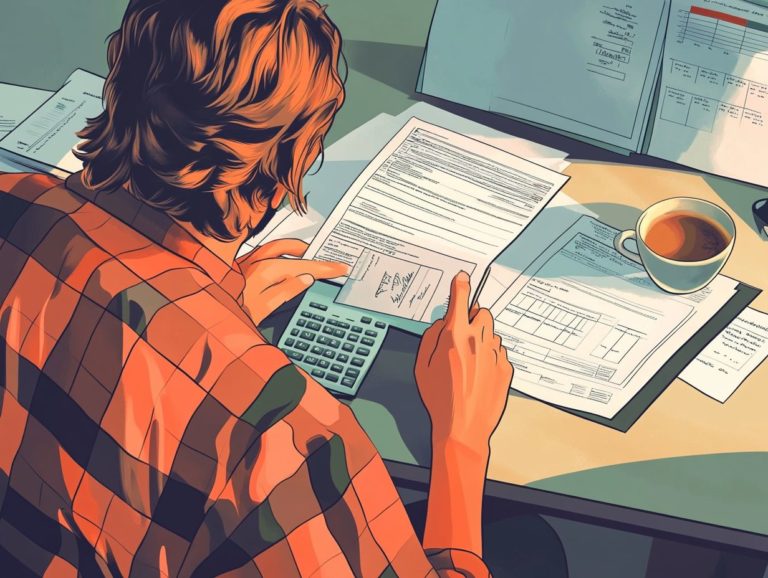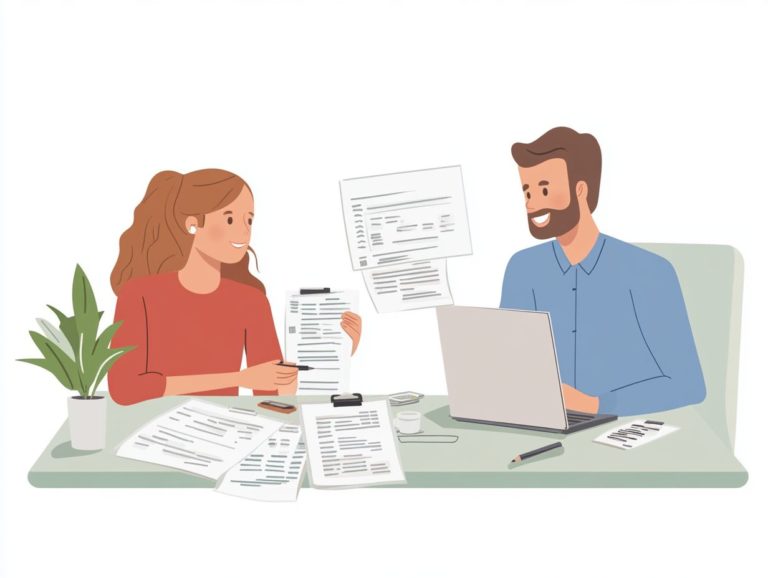5 Important Tax Deadlines for Freelancers
Navigating the world of taxes can be particularly daunting for freelancers like you, who often juggle multiple responsibilities without the safety net of a traditional paycheck.
Understanding key tax deadlines is essential for ensuring compliance and avoiding unnecessary penalties. This article breaks down five vital tax deadlines you should know, covering estimated tax payments, quarterly deadlines, and retirement account contributions.
It also delves into the unique considerations freelancers face, empowering you to take charge of your financial future with confidence.
Contents
- Key Takeaways:
- 1. Estimated Tax Payments
- 2. Quarterly Tax Deadlines
- 3. Tax Filing Deadline
- 4. Self-Employment Tax Deadline
- 5. Retirement Account Contribution Deadlines
- What Are Estimated Tax Payments and Why Are They Important for Freelancers?
- How Can Freelancers Determine Their Quarterly Tax Payments?
- What Happens If a Freelancer Misses a Quarterly Tax Deadline?
- Why Is the Tax Filing Deadline Different for Freelancers?
- What Is Self-Employment Tax and How Is It Calculated?
- Why Is It Important for Freelancers to Contribute to Retirement Accounts?
- Frequently Asked Questions
- What Are the 5 Important Tax Deadlines for Freelancers?
- Why is the January 15th deadline important for freelancers?
- What is the importance of the April 15th deadline for freelancers?
- What happens if a freelancer misses the April 15th deadline?
- Why is the June 15th deadline important for freelancers?
- What are the September 15th and October 15th deadlines for freelancers?
Key Takeaways:

- Freelancers must make estimated tax payments to the IRS throughout the year to avoid penalties.
- Quarterly tax deadlines, including estimated tax payments and self-employment tax, fall on April 15, June 15, September 15, and January 15.
- The tax filing deadline for freelancers is typically April 15, but it can differ depending on certain circumstances.
1. Estimated Tax Payments
Estimated tax payments are an essential financial responsibility for self-employed individuals, including freelancers and independent contractors. You must navigate the complexities of tax laws and obligations to avoid penalties from the IRS and maintain your financial well-being.
Unlike regular income tax payments that employers withhold from paychecks, estimated taxes require you to calculate how much tax you owe and remit tax payments quarterly. This can often lead to feelings of uncertainty, as any miscalculations may result in underpayment and potential fines.
To alleviate this burden, many find that leveraging digital tools like TurboTax and QuickBooks can significantly simplify the process. These platforms not only assist in tracking your income and expenses but also help you accurately calculate what s owed for estimated taxes, ensuring you remain compliant while effectively managing your cash flow throughout the year.
2. Quarterly Tax Deadlines
Quarterly tax deadlines are essential milestones for you as a freelancer or self-employed individual. These are the dates when you need to submit your estimated tax payments to the IRS, ensuring you remain compliant and avoid any unpleasant tax penalties.
Mark your calendar for the 15th of April, June, September, and January; these crucial deadlines provide a clear structure for meeting your tax obligations. If you miss these dates, you could face hefty fines, increased interest on any unpaid amounts, and even potential IRS audits. Staying organized is crucial! To enhance your financial knowledge, consider these 5 essential tax tips for creative freelancers to avoid penalties by keeping track of these important dates.
To avoid these pitfalls, consider implementing strategies for setting reminders, like using calendar apps or automated alerts. Embracing e-filing options streamlines your payment process, ensuring that all payments are documented accurately and submitted on time. This approach not only alleviates stress but also enhances your overall financial management.
3. Tax Filing Deadline
The tax filing deadline is a crucial moment for freelancers and self-employed individuals, representing the date by which you must submit your income tax returns to the IRS. Missing this deadline could lead to penalties and complications with tax compliance.
This annual deadline stands in stark contrast to quarterly tax deadlines, which require you to make estimated payments throughout the year. If you overlook these quarterly deadlines, you could face additional fees and the mounting stress that comes with tax season looming on the horizon. For freelancers, knowing what to do when you miss a tax deadline is crucial to managing your finances effectively.
By staying on top of the annual filing deadline, you not only avoid unnecessary penalties but also free yourself to concentrate on growing your business without the weight of tax worries. To learn more about managing your obligations, check out how to prepare for tax season as a freelancer. E-filing offers a streamlined approach to tax preparation, enabling you to submit your returns swiftly and securely.
Utilizing digital tools like TurboTax can help simplify complex calculations and deductions, enhancing the efficiency of the filing process while ensuring your accuracy and compliance with ever-evolving tax regulations.
Take charge of your tax responsibilities today! Start utilizing digital tools and stay informed about deadlines to ensure your financial success as a freelancer.
4. Self-Employment Tax Deadline

The self-employment tax deadline is a crucial date for independent contractors and freelancers. It’s when you must report your self-employment income and pay the associated taxes to the IRS.
Unlike regular income tax, which is often conveniently withheld from your paycheck, self-employment taxes cover Social Security and Medicare taxes that you need to calculate and remit yourself.
Missing this deadline can result in penalties, higher interest rates on unpaid balances, and complications with your future tax returns. To navigate this with ease, you must employ income tracking and accounting systems.
These tools will help you accurately calculate your taxes based on net earnings. By regularly updating your financial records, you’ll be better positioned to estimate your tax obligations and avoid surprises come filing season.
5. Retirement Account Contribution Deadlines
Retirement account contribution deadlines are critical for freelancers and self-employed individuals who wish to maximize their tax deductions and secure a stable financial future.
Understanding IRS rules related to retirement contributions can greatly influence your savings strategies. For example, you might choose between a SEP IRA, a retirement account designed for self-employed individuals that allows you to save for retirement while lowering your taxable income, and a Solo 401(k), which offers unique benefits based on your income and business structure.
Contributions to these accounts can effectively lower your taxable income, providing immediate financial relief during tax season. Missing these contribution deadlines could mean missed opportunities for tax deductions, so it’s vital to stay informed about these timelines.
By prioritizing your financial health through retirement planning and adhering to deadlines, you can enhance your financial security and prepare for a comfortable retirement.
What Are Estimated Tax Payments and Why Are They Important for Freelancers?
Estimated tax payments are crucial for freelancers, embodying a proactive approach to financial planning. They help you meet your tax obligations to the IRS while reducing the risk of underpayment penalties.
Calculating these payments usually involves projecting your future income based on your current earnings and any anticipated changes in contracts or client engagements. By anticipating your tax liability, you can make informed decisions about how much to set aside. For first-time freelancers, following freelancer tax tips can help you avoid unpleasant surprises during tax season.
Utilizing tools like TurboTax can streamline this process, offering features that assist in managing your income and deductible expenses. Understanding your tax responsibilities is essential; neglecting to make adequate payments can lead to financial strain, including costly penalties and interest charges that may accumulate over time.
How Can Freelancers Determine Their Quarterly Tax Payments?
You can determine your quarterly tax payments by accurately tracking your income and expenses. Utilizing financial tools like TurboTax allows you to calculate your estimated tax obligations based on projected earnings and applicable deductions.
To simplify this process, consider implementing a reliable bookkeeping system, such as QuickBooks. This can help you categorize expenses, maintain organized records of receipts, and generate insightful reports revealing your income trends over time.
Regularly assessing potential tax credits and deductions is crucial, as this can alleviate some of your tax burdens. By setting aside a portion of each payment you receive for estimated taxes and adjusting these figures quarterly, you can proactively avoid unwelcome surprises during tax season while ensuring compliance with federal and state tax requirements. Additionally, exploring 5 ways to lower your tax liability as a freelancer can further enhance your financial strategy.
What Happens If a Freelancer Misses a Quarterly Tax Deadline?

If you miss a quarterly tax deadline as a freelancer, you could face serious repercussions. The IRS can impose tax penalties that may negatively impact your financial health and future tax obligations.
These penalties often start with a failure-to-file penalty, which can be hefty and compounded by interest on the amount you owe. This means the consequences can escalate rapidly, leaving you in a tough spot trying to catch up.
Don t stress! You have options to lighten your financial burden. You can apply for an installment agreement, which allows you to pay your tax debt in smaller amounts over time, or request an extension for filing your taxes. Explore tax relief programs that may help reduce penalties or interest if you can show a good reason for your late payments.
Why Is the Tax Filing Deadline Different for Freelancers?
The tax filing deadline for freelancers differs from that of traditional employees, primarily due to the distinct nature of self-employment. As an independent contractor, you need to file your tax returns by a specific date set by the IRS, often with the option to request extensions.
This difference arises because freelancers must report not only their income but also their allowable deductions, which can vary widely from month to month. Unlike regular employees who receive a W-2 and have taxes withheld throughout the year, freelancers face the intricate challenge of estimating their tax obligations based on fluctuating income streams. To navigate this complexity, it’s essential to follow tax planning tips for new freelancers.
By understanding these complexities, you can navigate your filings with greater ease. Utilizing filing extensions can give you additional time to gather essential documentation, ensuring accurate reporting of all income and eligible deductions. This strategy enhances your tax situation. It allows you to file accurately.
What Is Self-Employment Tax and How Is It Calculated?
Self-employment tax helps fund Social Security and Medicare, which provide essential benefits. This tax is calculated based on your net earnings and is reported through IRS 1099 forms.
These taxes fund essential social programs that benefit both you and the broader community. To determine your self-employment tax accurately, consider all sources of income, including freelance work, contract jobs, and any side gigs that contribute to your overall earnings. Additionally, be sure to explore 5 tax credits freelancers shouldn’t miss to maximize your deductions.
Diligent income tracking is vital for understanding your tax liabilities. Establishing an effective bookkeeping system is key in this endeavor, ensuring that all your incomes and expenses are recorded with precision. To maximize your deductions, consider applying 5 tips for freelancers on tax write-offs. This not only simplifies your tax calculations but also enhances your financial clarity, giving you the power to make informed business decisions.
Why Is It Important for Freelancers to Contribute to Retirement Accounts?
Contributing to retirement accounts is essential for freelancers. It not only secures your financial well-being in the future but also offers valuable tax deductions that can effectively reduce your overall tax liabilities in line with IRS regulations.
By exploring various options like a Solo 401(k), SEP IRA, or Simple IRA, you can customize your retirement savings strategy to align with your income levels and retirement ambitions. Making early contributions can yield significant benefits, allowing your savings to compound over time and create a substantial impact down the road. By investing early, you harness the power of compound interest, which can dramatically bolster your financial security.
Given the income fluctuations common in freelancing, strategic planning through these accounts provides tax advantages and helps ensure a more stable financial future.
Frequently Asked Questions

What Are the 5 Important Tax Deadlines for Freelancers?
- January 15th
- April 15th
- June 15th
- September 15th
- October 15th
For more detailed guidance, consider consulting a tax professional to stay informed about your tax obligations.
Why is the January 15th deadline important for freelancers?
The January 15th deadline is important for freelancers. It is when the final estimated tax payment for the previous year is due.
What is the importance of the April 15th deadline for freelancers?
The April 15th deadline is crucial for freelancers. It marks the last day to file their annual tax return and pay any taxes owed.
What happens if a freelancer misses the April 15th deadline?
Missing the April 15th deadline can lead to penalties and interest on taxes owed. Freelancers should file for an extension if they can t meet this deadline.
Why is the June 15th deadline important for freelancers?
The June 15th deadline is significant for freelancers. It is when the second estimated tax payment for the current year is due.
What are the September 15th and October 15th deadlines for freelancers?
The September 15th and October 15th deadlines are key for freelancers. These dates are when the third and fourth estimated tax payments are due.






